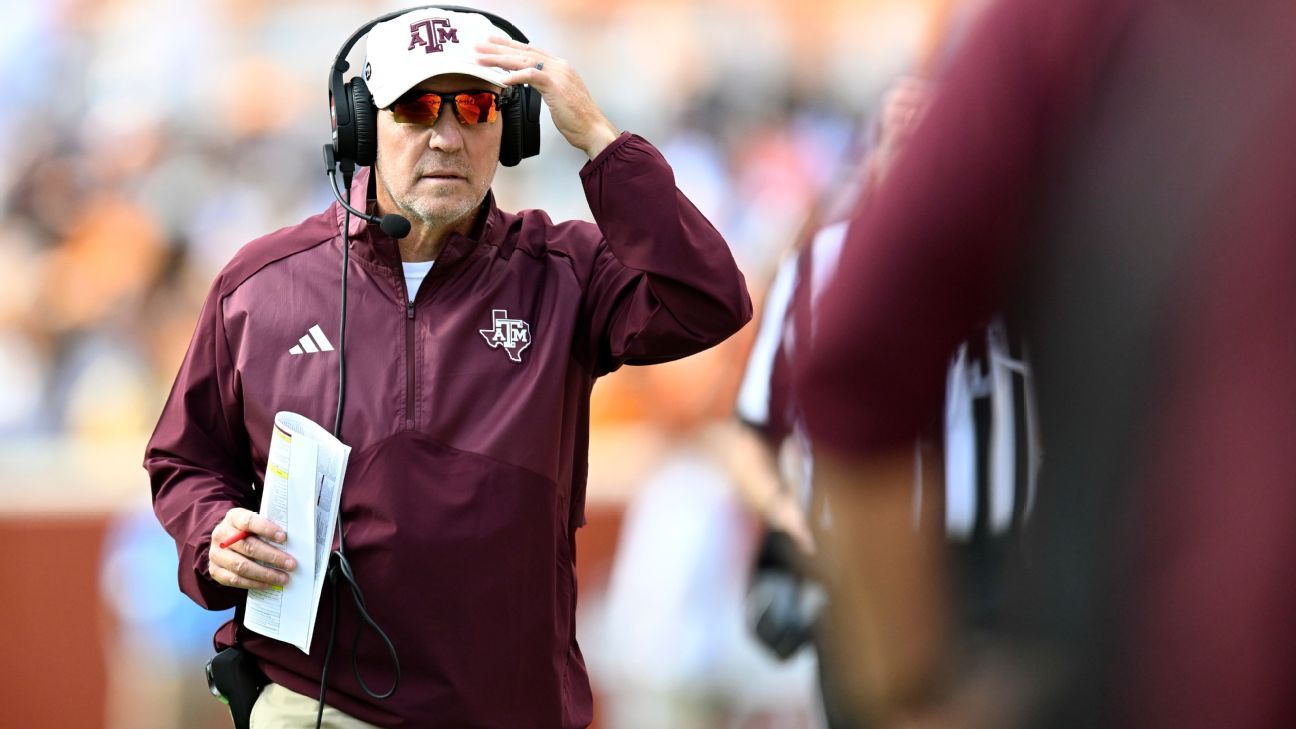
Texas A&M‘s record $76 million contract buyout for fired football coach Jimbo Fisher accounts for more than half of the approximately $146 million Power 5 schools owe to fired head football coaches since the start of the 2022 season, according to publicly available data.
Fisher’s buyout is nearly triple the highest known coaching contract buyout at a public school. The previous record was set by Auburn‘s 2020 buyout of football coach Gus Malzahn, which cost $21.7 million.
According to an ESPN analysis of athletic department financial records and contracts, Power 5 and Group of 5 programs spent more than $533 million in dead money — owed to coaches who were fired without cause with time left on their contracts — in the 11-year period from Jan. 1, 2010, to Jan. 31, 2021. That included payments to football coaches and men’s and women’s basketball coaches and accounted for head and assistant coaches.
Also included in the $146 million owed since the beginning of the 2022 season:
• $15.5 million for Bryan Harsin, fired from Auburn in October 2022.
• $15 million for Scott Frost, fired from Nebraska in September 2022.
• $11.4 million for Geoff Collins, fired from Georgia Tech in September 2022.
• $11 million for Paul Chryst, fired from Wisconsin in October 2022.
• $8.7 million for Karl Dorrell, fired from Colorado in October 2022.
• $4.4 million for Herm Edwards, fired from Arizona State in September 2022.
• $4 million for Zach Arnett, fired from Mississippi State on Monday.
Buyouts can change depending on certain circumstances, including whether a coach lands a new job. According to the terms of Fisher’s contract, Texas A&M will owe Fisher $19.2 million within 60 days and then pay him $7.2 million annually through 2031. There is no offset or mitigation on those payments, and the annual payments start 120 days after termination.
Texas A&M athletic director Ross Bjork said in a news conference Sunday that the school “has to learn a lesson” from Fisher’s contract and that the finances involved in his firing are “monumental.”
“We will use unrestricted contributions within the 12th Man Foundation for the first one-time payment and the athletic department will fund the annual payments for the remaining portion by growing our revenues and adjusting our annual operating budget accordingly,” he said. “Although this is a major, major financial decision that comes with many consequences, we have a plan and we will not let this impact the performance or the culture of our entire athletics program.”
Texas A&M’s athletic department generated about $193 million in revenue in 2022, ranking seventh among public Power 5 colleges, according to the Knight-Newhouse College Athletics Database. Fisher’s buyout is just $6 million less than the Kansas State athletic department’s total expenses in 2022, which were about $82 million.
The trend, dating to last fall, of firings occurring from midseason to before conference championships has been accelerating. Previously, most coaching changes took place in early December. The transfer portal opens Dec. 4, and the early signing period begins Dec. 20.
B. David Ridpath, Ohio University sports business professor and a member of The Drake Group, an organization that lobbies Congress on issues in college athletics, said that despite claims of donors footing the bill for buyouts, “regardless of where the money comes from, all money is state money at a public institution.” While he said he understands some severance is needed for coaches fired for performance reasons, it doesn’t make sense to pay out their entire contracts for essentially a failure to perform.
Ridpath said the ability of schools to pay these buyouts shows that they can come up with the money to pay athletes, which is a highly debated issue among university leaders, the NCAA, conferences, legislators and athlete advocacy groups.
“I would like to think [the Fisher buyout] would be so outrageous that the Texas public policy groups or state legislators or federal delegation says, ‘Hold on a second. Our public institutions should not be doing this,'” Ridpath said. “What I fear is, this is only going to get larger. The only thing that will stem this tide is if the labor is paid,” and more money goes to the athletes instead of the coaches.
The $146 million calculation does not include contract money potentially owed to former Michigan State coach Mel Tucker, who was fired for cause in September amid a sexual misconduct investigation, or to former Northwestern coach Pat Fitzgerald, who was fired following an investigation into hazing allegations. Fitzgerald is suing Northwestern for wrongful termination, and Tucker has said he is preparing to file a similar lawsuit against Michigan State.






